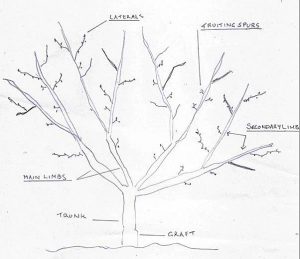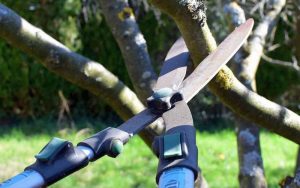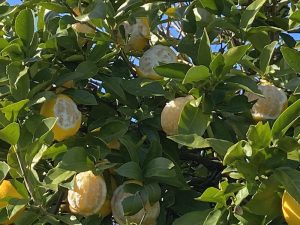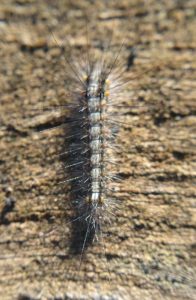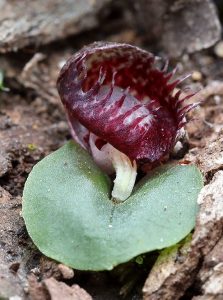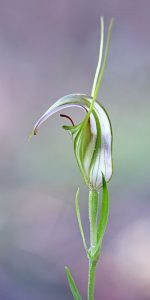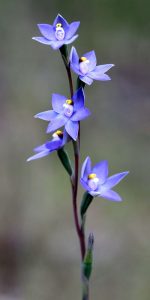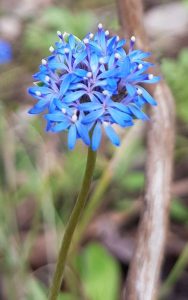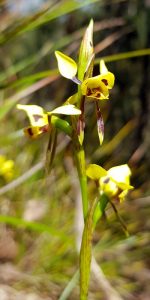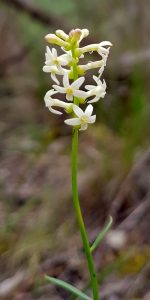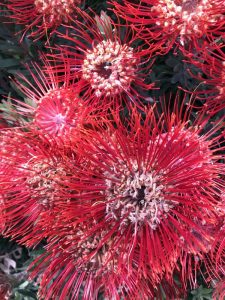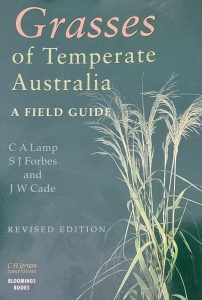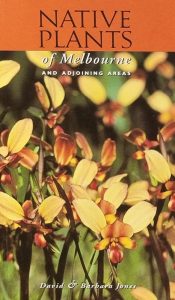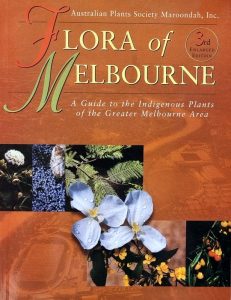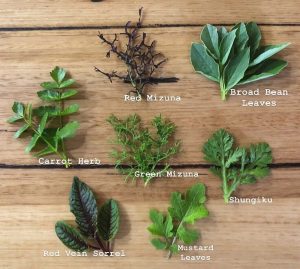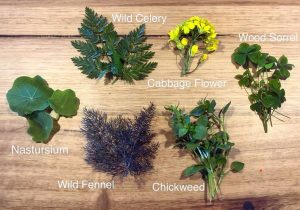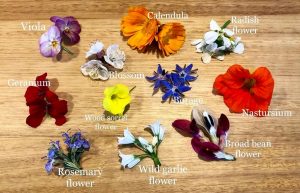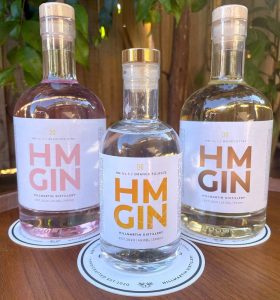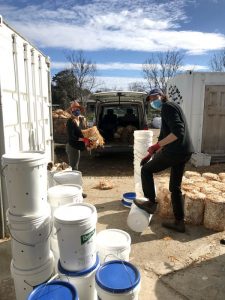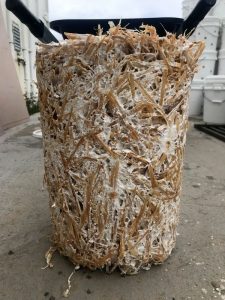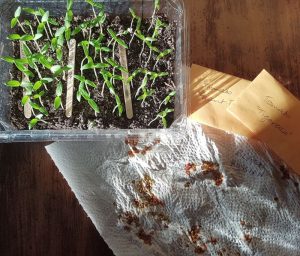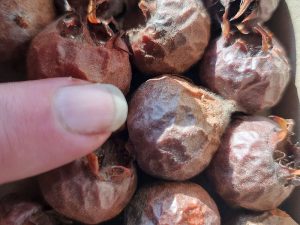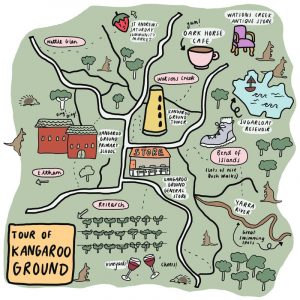Thanks to the people who have contributed to this week’s newsletter: Angelo Eliades, Bev Middleton, Carol Woolcock, Frances Gibson, Georgie Nathan, Jaimie Sweetman, Jill Brailsford, Lynn-eva Bottomley, Maria Callipari, Megan Goodman, Pam Jenkins, Pauline Webb, Roger Warr.
If you are Gmail user and didn’t successfully receive our newsletter last week, read this short guide on how to stop Google’s blocking of our future newsletters.
The more people who contribute material, the better this newsletter. If you have any interesting news, tips, photos or questions, email them to us.
The white ginger lily (Hedychium coronarium) by Jaimie Sweetman
[Jaimie Sweetman is Head Gardener of the Edible Forest located on the Yarra Valley Estate in Dixons Creek. Tours of the Edible Forest, often led by Jaimie, take place on Fridays and Saturdays – read more and book your place on a future tour.]
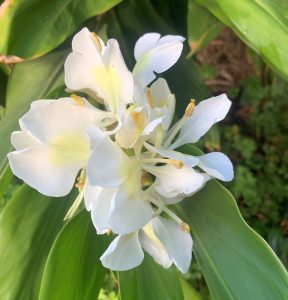 After spending today cutting back the ginger lilies in the garden, I thought about how beautiful it looked. And it is also edible.
After spending today cutting back the ginger lilies in the garden, I thought about how beautiful it looked. And it is also edible.
The white flowers have a strong floral fragrance and taste floral as well. They can be used to top salads, desserts or as a garnish for an elegant look.
The white ginger lily originates from Asia and can be a weed in more tropical areas. Here in Melbourne it does quite well though and adds a tropical theme to your garden. Usually an under-story plant, it does best in a more protected spot under a canopy or among other plants.
Placed in a border near a pathway, the flowers smell lovely walking past and the ginger stems add an architectural element to the garden.
Definitely one of the more beautiful ornamental ginger lilies to grow and it is edible too.
Pam Jenkins on eating Brussels sprout leaves
With the increase in the cost of fruit and vegetables, I (Pam) have started thinking about the amount of food that we waste because, traditionally, some parts of the vegetable crops just aren’t eaten.
Take Brussels sprouts, for example. When they are harvested, the leaves below the sprouts being harvested are torn off and generally discarded. These leaves feel at least as tender as kale which set me wondering why we dispose of them with such gay abandon. Time to consult Chef Google. There are many recipe options. Here is the link to one I tried. The verdict: the Brussels sprout leaves were quite tender and not at all fibrous. The recipe was very tasty as a side dish. I think that the leaves could also be cooked in any sort of kale recipe once you remove the larger veins.
Moving on, why do we dispose of so many outer cabbage leaves? The very outer ones may be tough and fibrous but some a little further in may be a bit ragged or just not the heart. I’ll try them out when my cabbages mature.
Bev’s soil fun fact of the week
[Bev Middleton lives in Macleod and is from Soil Week Australia.]
Most of the antibiotics that we use to fight illness originated from soil microbes, which employ them as weapons in the competition for resources and survival. Penicillin, the first successful antibiotic, came from the soil fungus Penicillium.
Yes you did know (sort of)!
Last week, Jeremy Mather asked what was eating the rind of the lemons on his tree and what could he do about it. A number of you responded, but with differing views.
Angelo Eliades: Possums. Cockatoos don’t eat the peel, but the seeds inside. Rats wouldn’t have eaten that much peel. Protect the fruit with nets, either netting bags (2mm mesh drawstring bags that go around the fruit) or just net the tree.
Carol Woolcock: Snails. They hide under the leaves during the day and come out at night to feast. The best remedy is to inspect the tree and remove the snails on a daily basis until the problem is resolved.
Pauline Webb: Maybe possums but I would suspect rats. My lemons are similar and they then fall to the ground when a bite is taken from the skinless fruit. By contrast, my mandarins are eaten out (fruit only) leaving withering skins on the tree.
Roger Warr: Maybe rats or mice. We have them and they do similar damage, although ours also eat the flesh.
FWIIW, I agree with Angelo: the most likely culprit when the citrus rind has been eaten but not the insides is possums.
Want some truffle?
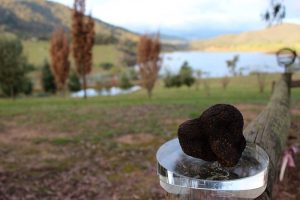 Eltham residents, Frances and Greg Gibson, from Howqua Truffles, are currently harvesting their truffles in the High Country town of Mansfield beside the Howqua River. If you are interested in purchasing some of this delicacy, contact them by phone (0409 414 325) or email (howquatruffles@gmail.com). Pick up in Eltham.
Eltham residents, Frances and Greg Gibson, from Howqua Truffles, are currently harvesting their truffles in the High Country town of Mansfield beside the Howqua River. If you are interested in purchasing some of this delicacy, contact them by phone (0409 414 325) or email (howquatruffles@gmail.com). Pick up in Eltham.
As someone who has never tasted truffles, I have just bought some from Frances and Greg and will report back in a future newsletter.
Are you an agriculture business in Nillumbik?
On Saturday 22nd and Sunday 23rd October, Nillumbik Council will be hosting an Open Farm Day program at Edendale Farm. There will be a business-to-business oriented program on the Saturday and a ‘meet the farmer’ program for the public on the Sunday. If you are a Nillumbik-based agricultural businesses that would potentially like to be involved in the Sunday program where you can undertake demonstrations, sell and promote your produce and offer educational workshops, complete their brief expression of interest form.
Not (quite) local but interesting
Community gardening is clearly vibrant in the municipality of Hume. As per their calendar of events in Winter and Spring 2022, there are 4 community gardens (in Craigieburn, Roxburgh Park, Sunbury and Westmeadows) and there are multiple upcoming events in each garden. Bookings are required for all events, most via Hume Council’s Eventbrite page. Also, read Hume Council’s page on community gardens.
Thanks for all the info, Maria Callipari!
The bird-dropping spider
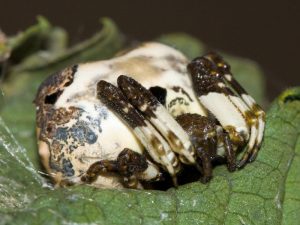
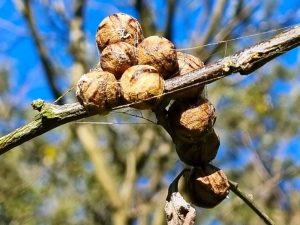 Lynn-eva Bottomley has sent in the left photo which is apparently of the egg sacs of a bird-dropping spider (Celaenia excavata), which Lynn-eva found whilst pruning her plum tree. The Australian Museum has a page about this spider, which includes the following facts:
Lynn-eva Bottomley has sent in the left photo which is apparently of the egg sacs of a bird-dropping spider (Celaenia excavata), which Lynn-eva found whilst pruning her plum tree. The Australian Museum has a page about this spider, which includes the following facts:
- Each egg sac contains around 200 eggs, with up to 13 sacs silked together in a group.
- The spider is called the bird-dropping spider because it (the spider, not the egg sac) looks like a bird dropping (see right photo).
- The males are minute (2.5mm in length compared to 12mm for the females).
- The spider’s diet consists almost exclusively of male moths, which it hunts at night by mimicking the scent of female moths to attract them.
Newsletter reader of the week – Jill Brailsford
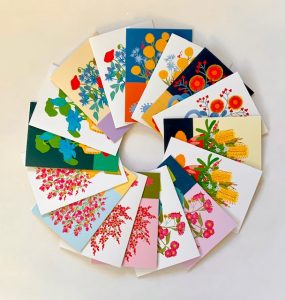
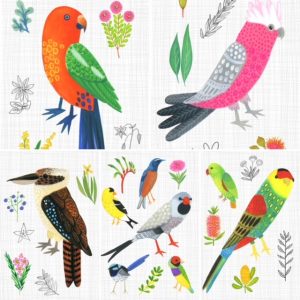 Jill Brailsford is an artist who sells a wide range of her art online, including original paintings, art prints, greeting cards and painted stained glass. “I have many cards and prints with Australian native plants and animals which your newsletter readers might be interested in.”
Jill Brailsford is an artist who sells a wide range of her art online, including original paintings, art prints, greeting cards and painted stained glass. “I have many cards and prints with Australian native plants and animals which your newsletter readers might be interested in.”
It has become clear to me that what we want for this section is newsletter readers who have websites that might be of interest to (some of) the rest of us. Those websites certainly don’t have to be food-related, just a bit interesting. Jill’s website is a good example. Do you have a website that might be of interest? If so, send me an email and I will include you in a future newsletter.
The photo competition
The results of last week’s competition
Four people sent in photos and the winner is Jo Douglas’ photo of her dried grasses.
| Gina Wilson”
I planted native grasses in my frontyard about 20 years ago. Some have thrived, some are sparse, and I can’t remember the names of any of them – sorry!“ |
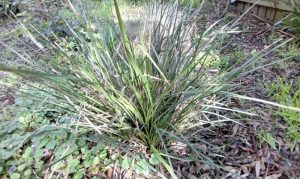
|
| Jo Douglas THE WINNER “This bunch of grasses were picked on a late summer walk in Hurstbridge last year. They remind me strongly of the wide blue late afternoon summer sky contrasting with the blonde grasses flowering at my feet. It includes, roughly left to right, Themeda, Danthonia, Sweet vernal, Yorkshire fog, Briza maxima and minor and Stipa.“ |
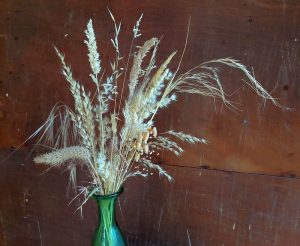 |
| Lee Hirsh
“I created the arrangement from some grasses that I gathered from the Mornington Beach.“ |
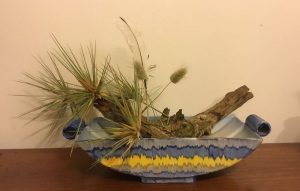 |
| Rowena Scott Poa sp. (tussock-grass)” Frosted poa in a Gardens for Wildlife (G4W) planting beside frozen kidney weed.“ |
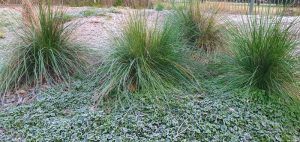 |
This week’s competition
The theme of this week’s competition is plants that are native to Australia but not native to Victoria and the prize is Australian native plants by John Wrigley and Murray Fagg, which weighs in at a hefty 500 A4 pages..
To enter the competition, email your photos of any plants that are native to Australia but not native to Victoria, including identification, by end of play Monday, 1st August. Our judging panel will then cogitate on Tuesday and the various entries will be included in the newsletter on Wednesday. Pick up the prize from my house in Eltham.
This is the last of the photo competitions to give away Stuart Rodda’s books.
Meg’s garden this month
My (Meg’s) wattle is out and provides a spot of cheery yellow colour that wards off the cold. The frosty weather has limited my time in the garden this month and everything from the worms to the pets seem to want to be tucked under blankets. Instead, I’ve spent the day looking through old recipes written in copperplate on discoloured scraps of paper. They are treasured and need to be transposed so not lost. Here is one of the recipes.
Grandma’s chocolate ginger slice
155g chopped dates
125g butter
½ cup sugar
60g crystalised ginger, very finely chopped
3½ cups of cornflakes
300g chocolate, to melt
Stir the dates, chopped butter, sugar and ginger over low heat in a large pan until the dates are soft.
Remove from the heat and add the cornflakes, mixing well.
Press into a lined square brownie or slice tin and refrigerate to set.
Once set, melt the chocolate, and spread over the top. Refrigerate again to set.
Cut into small squares and serve.
Note: Grandma would use 1 cup of drinking chocolate with 125g melted copha to replace the more expensive chocolate.
Read more of Megan Goodman’s recipes on our website.
Some of our articles you might have missed over the last month
- Spurrell Foraging (by Ann Stanley).
- Pruning and care of deciduous fruit trees (by Robin Gale-Baker).
- Testing the pH of your soil (by Stuart Rodda).
- Pruning of mature deciduous fruit trees (by Therese Scales).
Which link was clicked most times in the last newsletter?
The most popular link in the last newsletter was Angelo’s article on how long different fruit trees live.
Regular activities over the coming week
Farmers’ markets
- Saturday: Abbotsford and Coburg.
- Sunday: Alphington, Carlton and Eltham.
Food swaps
- Saturday: Brunswick East and Rosanna.
- Sunday: Zip.
Community gardens
- Thursday: Diamond Valley Library (Greensborough), Edible Hub (Hurstbridge), SEEDs (Brunswick) and Whittlesea.
- Friday: Reynard Street (Coburg) and West Brunswick.
- Saturday: Links (Lalor), Macleod, Reynard Street (Coburg) and Thrive (Diamond Creek).
- Sunday: Fawkner Food Bowls, Pentridge (Coburg) and Regent (Reservoir).
- Monday: SEEDs (Brunswick) and Whittlesea.
- Tuesday: Watsonia Library.
- Next Wednesday: Living & Learning Eltham, Macleod, Newton Street (Reservoir), Span (Thornbury) and Sylvester Hive (Preston).
Upcoming face-to-face events – not cooking
The art of espalier; Saturday, 3rd September, 9.30am-12.30pm; $55 ($18 per hour); Bulleen Art and Garden Nursery.
What you will learn: growing espaliered fruit trees; different techniques to make the most of all available space for espalier; and improve your general gardening skills. Topics will include suitable fruit trees, pruning and training techniques. Presenter: Diana Cotter.
Setting up a worm farm; Saturday, 3rd September, 2-3.30pm; free; Edendale.
This workshop will cover both the theory and practice of worm farming in a household setting. It will be useful for those wishing to recycle household food waste in order to produce worm products for use in the improvement of soil in gardens and pot plants.
Permaculture Design Course (80 hours); on Thursdays from 8th September to 8th December; $595; Kinglake.
The subjects to be covered will include: permaculture ethics and design principles; water systems; building healthy soils; passive solar building and retrofitting existing buildings; building greater personal and community resilience; growing nutrient dense food; and emerging opportunities in the new economy.
Produce in pots; Saturday, 10th September, 9.30am-12.30pm; $55 ($18 per hour); Bulleen Art and Garden Nursery.
What you will learn: why edibles fail and how to improve their chances of success; how to choose the right pots, potting mix, additives and mulches; the best fruit and vegetables options for pots; and the best sustainable and organic maintenance techniques, including watering and feeding. Presented by Diana Cotter.
Introduction to beekeeping; Thursday, 15th September, 11am-midday; free; Greensborough.
Bob’s Beekeeping staff will discuss what is involved in keeping your own hive of bees.
Growing mushrooms at home; Saturday, 17th September, 10am-12.30pm; $95 ($38 per hour); Alphington.
Presenter: Julia Laidlaw from Sporadical City Mushrooms. This hands-on, beginners workshop will cover basic oyster mushroom growing. It will be a skill sharing ‘tips and tricks’ lesson from an experienced commercial mushroom grower who started growing very basically at home in a small space with no technical equipment in the inner city. You will take home your own mushroom growing kit that you prepared during the workshop, the materials and instructions needed to prepare a kit at home (re-purposed plastic bucket & lid, oyster mushroom grain spawn, enough straw for a grow kit, bag for pasteurising straw, small bottle of isopropyl alcohol for sterilisation).
An intro to beekeeping; Sunday, 18th September, 9.30am-12.30pm; $55 ($18 per hour); Bulleen Art and Garden Nursery.
What you will learn: a foundational knowledge of keeping bees; the set up and tools of a hive; and the financial, time inputs and responsibilities. You will see a working hive and taste some honey. Presented by Sarah Buchanan.
In July
- International wine masterclass; Saturday, 30th July, 3-5pm; $63 ($32 per hour); Northcote.
- Beekeeping – how to get started; Sunday, 31st July, 9.30-10.45am; $20 (reimbursable at the nursery); Diamond Creek.
- Introduction to growing microgreens; Sunday, 31st July, 10am-midday; $60 ($30 per hour); Preston.
- Home brewing; Sunday, 31st July, 10am-3pm; $80 ($18 per hour); CERES.
- Cheese and wine tasting; Sunday, 31st July, 2-5pm; $55 ($18 per hour); Brunswick East.
In August
- Gin tasting with Naught Distillery; Monday, 1st August, 7-9pm; $43 ($22 per hour); Montmorency.
- Fruit tree pruning with Kaye Roberts-Palmer; Tuesday, 2nd August, 11am-12.30pm; free; Doncaster.
- Fruit tree pruning workshop; Saturday, 6th August, 10-11.30am; $44 ($29 per hour); Carlton North.
- Basic inoculation workshop; Saturday, 6th August, 10am-midday; $87 ($44 per hour); Alphington.
- Grafting and tree sales day; Saturday, 6th August, 10am-midday; free; CERES.
- Learn Winter fruit tree pruning; Saturday, 6th August, 10am-12.30pm; $25 ($10 per hour); Forest Hill.
- Wicking bed wow; Saturday, 6th August, 10am-1pm; $189 ($38 per hour); Ringwood.
- Crop rotation and companion planting; Saturday, 6th August, 11am-midday; free; Watsonia.
- Alternative varietals wine masterclass; Saturday, 6th August, 3-5pm; $63 ($32 per hour); Northcote.
- Introduction to meadmaking (three sessions); Saturdays 6th August, 3rd September and 24th September, all 10am-midday; $50; Eltham.
- Grafting and tree sales day; Sunday, 7th August, 9am-midday; free; Templestowe.
- Healthy productive compost and worms; Sunday, 7th August, 9.30am-12.30pm; $50 ($17 per hour); Bulleen Art and Garden Nursery.
- Herb planting workshop; Sunday, 7th August, 10-11.30am; $60 ($40 per hour); Park Orchards.
- In-depth mushroom cultivation workshop; Sunday, 7th August, 10am-4pm; $165 ($28 per hour); Alphington.
- Foundation to organic gardening course (3 sessions); on 3 consecutive Sundays from 7th August, 10am-1pm; $65 ($7 per hour); Richmond.
- Introduction to horticultural permaculture (4 sessions); on 4 consecutive Mondays from 8th August, 10am-2.30pm; $50 for all 4 sessions; Eltham.
- Care of backyard chickens; Thursday, 11th August, 11am-midday; free; Greensborough.
- Mushroom foraging; Thursday, 11th August, 7-9pm; $85 ($43 per hour); Collingwood.
- Growing fruit and veggies in small spaces; Sunday, 14th August, 9.30am-12.30pm; $50 ($17 per hour); Bulleen Art and Garden Nursery.
- Composting and worm farms; Monday, 15th August, 4.30-6pm; free; Kew.
- DIY mushrooms; Saturday, 20th August, 10am-4pm; $165 ($28 per hour); CERES.
- Bees in your backyard; Saturday, 20th August, 10-11am; free; Balwyn.
- Meet the wine makers – Golding Wines; Saturday, 20th August, 3-5pm; $63 ($32 per hour); Northcote.
- Compost and worm farms; Sunday, 21st August, 9.30-10.15am; $15 (reimbursable at the nursery); Diamond Creek.
- Growing mushrooms at home; Sunday, 21st August, 10am-12.30pm; $95 ($38 per hour); Alphington.
- Preparing for a summer veggie crop; Saturday, 27th August, 9-10.30am; free; Camberwell.
- Winter fruit tree maintenance; Saturday, 27th August, 9.30am-midday; $55 ($22 per hour); Bulleen Art and Garden Nursery.
- Australian plants expo; Saturday, 27th August, 10am-4pm; $5; Eltham.
- Preparing for a summer veggie crop; Saturday, 27th August, 11.30am-1pm; free; Camberwell.
- Meet the wine makers – Chalmers; Saturday, 27th August, 3-5pm; $63 ($32 per hour); Northcote.
- Australian plants expo; Sunday, 28th August, 10am-4pm; $5; Eltham.
- Heal with food – skin health; Sunday, 28th August, 11am-1pm; free; Eltham.
In September
- Grazing board making workshop for women; Thursday, 1st September, 6-8pm; $189 ($95 per hour); Richmond.
- Veggie gardening for beginners; Thursday, 1st September, 6.30-9pm; $55 ($22 per hour); Bulleen Art and Garden Nursery.
- Complete urban farmer (14 sessions); weekly, starting Friday, 2nd September, 9am-3pm; $880 ($10 per hour); CERES.
- The art of espalier; Saturday, 3rd September, 9.30am-12.30pm; $55 ($18 per hour); Bulleen Art and Garden Nursery.
- Edible weeds walk; Saturday, 3rd September, 10.30am-12.30pm; $25 ($13 per hour); Brunswick East.
- Edible weeds walk; Saturday, 3rd September, 1.30-3.30pm; $25 ($13 per hour); Brunswick East.
- Setting up a worm farm; Saturday, 3rd September, 2-3.30pm; free; Edendale.
- Complete urban farmer (14 sessions); weekly, starting Wednesday, 7th September, 9am-3pm; $880 ($10 per hour); CERES.
- Permaculture Design Course (80 hours); on Thursdays from 8th September to 8th December; $595; Kinglake.
- Produce in pots; Saturday, 10th September, 9.30am-12.30pm; $55 ($18 per hour); Bulleen Art and Garden Nursery.
- Gardening in small spaces; Saturday, 10th September, 10am-3pm; $115 ($23 per hour); CERES.
- SEEDs Soup Festival; Sunday, 11th September, 11am-5pm; free; Brunswick.
Regular events
- Bakery Hill whisky distillery tour and tasting; various Sundays, various times; $64 ($43 per hour); Bayswater North.
- Beekeeping workshop; roughly once a month; $85 ($34 per hour); Brunswick East.
- Carlton aperitvio food tour; various Fridays, 5-7pm; $89 ($45 per hour); Carlton.
- Cocktail workshop; Saturdays, at 2pm and again at 5pm; $55 ($37 per hour); Northcote.
- Flavours of Coburg food tour; various Saturdays, 10am-1pm; $49 ($16 per hour); Coburg.
- Gin making masterclass; most Saturdays, 10am-1pm; $175 ($58 per hour); Nunawading.
- Ratio Cocoa Roasters behind the scenes chocolate factory tour; various Fridays and Saturdays; $15 ($10 per hour); Brunswick.
Upcoming face-to-face events – cooking
Lovely lemons; Wednesday, 7th September, 1.30-3pm; $5; Greensborough.
Make lemon butter. All equipment, materials and ingredients will be provided.
Cheese making with Tina van Kooten; Wednesday, 14th September, 10am-3pm; $90 ($18 per hour); Yarra Glen.
Tina van Kooten will make quick and easy feta plus microwave mozzarella. A light lunch will be provided with some homemade cheeses, and you will take your cheeses home to enjoy. BYO apron, rubber gloves and container with draining mat.
Middle Eastern cooking; Thursday, 15th September, 10.30am-1.30pm; $80 ($27 per hour); Park Orchards.
Learn about the flavours of Middle Eastern cooking. Try out recipes and cooking methods while preparing a three course menu. Stay and share your freshly prepared dinner with the group.
Sourdough bread workshop; Saturday, 17th September, 9-11.30am; $185 ($74 per hour); Brunswick East.
What you will learn: ways to create and look after your own sourdough starter culture; the flour to use for the best nutrition and results; ways to knead sticky high hydration dough for a more authentic sourdough loaf; the equipment needed to produce a great looking and tasting sourdough tin loaf at home; and ways to bake sourdough bread using a bread tin in a home oven. What you will get: comprehensive workshop notes; sourdough starter culture; and a discount on a professional quality bread tin. Tutor: Rick Lavender of The Life We Want.
Soft goat cheese curd and goat camembert cheese; Sunday, 18th September, 10am-4pm; $170 ($28 per hour); CERES.
What you will learn: how to make your own goats cheese; how to make ricotta cheese; and about different cheeses. Presenters: Janet Clayton and Charlene Angus from Cheeselinks.
In July
- Kombucha brewing workshop; Thursday, 28th July, 7-11pm; $54 ($14 per hour); Brunswick.
- Cup cake bouquet workshop; Friday, 29th July, 6.30-8.30pm; $70 ($35 per hour); Park Orchards.
In August
- Pickling and fermentation workshop; Thursday, 4th August, 7-9pm; free; Watsonia.
- Christmas cookie decorating workshop; Friday, 5th August, 6.30-8.30pm; $65 ($33 per hour); Park Orchards.
- Mozzarella making class; Saturday, 6th August, 10am-midday; $120 ($60 per hour); Thomastown.
- Sourdough bread making; Saturday, 6th August, 10am-12.30pm; $64 ($26 per hour); Lower Templestowe.
- Introduction to fermenting at home; Saturday, 6th August, 10am-1pm; $70 ($23 per hour); CERES.
- Cultural cooking – Indian breads; Saturday, 6th August, 11am-1pm; $50 ($25 per hour); Alphington.
- Chinese home cooking; Saturday, 6th August, 11am-1pm; $30 ($15 per hour); Brunswick.
- Cake decorating using coloured fondants; Sunday, 7th August, 1-4pm; $79 ($26 per hour); Surrey Hills.
- One pot wonders of the world – slow cooking in a master stock; Friday, 12th August, 5-9pm; $85 ($21 per hour); Panton Hill.
- Dumpling making workshop; Friday, 12th August, 6-9pm; $75 ($25 per hour); Park Orchards.
- Pasta making workshop; Monday, 15th August, 10-11am; $30 ($30 per hour); Park Orchards.
- Italian kids cooking class; Thursday, 18th August, 4.30-6.30pm; $35 ($18 per hour); Surrey Hills.
- Demystifying bread; Thursday, 18th August, 6.30-9pm; $60 ($24 per hour); Park Orchards.
- Pasta making; Thursday, 18th August, 7-9pm; free; Thomastown.
- Gingerbread house workshop; Friday, 19th August, 6.30-8.30pm; $70 ($35 per hour); Park Orchards.
- An artisan chocolate dessert class; Sunday, 21st August, 10am-1pm; $154 ($51 per hour); Alphington.
- Cheddar cheese making; Sunday, 21st August, 10am-5pm; $170 ($24 per hour); CERES.
- Sri Lankan cooking class; Wednesday, 24th August, 6-9pm; $90 ($30 per hour); Surrey Hills.
- Cooking with Jean; Thursday, 25th August, 7-8.30pm; free; Mill Park.
- Make low waste comfort food; Saturday, 27th August, 10am-12.30pm; $30 ($12 per hour); Forest Hill.
- Gnocchi making class; Saturday, 27th August, 10am-1pm; $125 ($42 per hour); Thomastown.
- Veggies in desserts; Sunday, 28th August, 10am-3pm; $115 ($23 per hour); CERES.
- Indian cooking – Punjabi (two sessions); Wednesday, 31st August and Wednesday, 7th September, both 6.30-8.30pm; $110 ($55 per hour); Hurstbridge.
In September
- Italian cooking (2 sessions); Thursday, 1st September and Thursday, 8th September, both 6-9pm; $190 ($32 per hour); Surrey Hills.
- Lovely lemons; Wednesday, 7th September, 1.30-3pm; $5; Greensborough.
- Sourdough bread; Saturday, 10th September, 10am-12.30pm; $75 ($30 per hour); Park Orchards.
- Growing, cooking, sharing – a harmony of tastes cooking class; Saturday, 10th September, 10am-1pm; $15; Forest Hill.
- Cultural cooking – Indian curries; Saturday, 10th September, 11am-1pm; $50 ($25 per hour); Alphington.
- Cheese making with Tina van Kooten; Wednesday, 14th September, 10am-3pm; $90 ($18 per hour); Yarra Glen.
Regular classes
- @drool.aus (Italian); various Saturdays and Sundays; roughly $100 ($40 per hour); Fitzroy and Northcote.
- Al dente cooking (Italian); most Saturdays, 9am-1pm; $155 ($39 per hour); Chirnside Park.
- Become a junior chocolatier; various days and times; $40 ($53 per hour); Yarra Glen.
- Beginners bread making; various Sundays, 8am-2pm; $220 ($37 per hour); Abbotsford.
- Chocolate discovery class; various days and times; $48 ($48 per hour); Yarra Glen.
- Chocolate making workshop; various Thursdays, Fridays and Saturdays; $152 ($38 per hour); Blackburn.
- La Cucina di Sandra (Italian); various evenings, 6.30-10.30pm; $105 ($26 per hour); Richmond.
- Nonna & Mum’s cooking class; monthly on the 4th Thursday, 6-10pm; $20 ($7 per hour); Thornbury.
- Otao Kitchen (various classes); various dates, times and prices; Richmond.
- Rosa’s traditional Italian cooking class; various Saturdays and Sundays; $155 ($39 per hour); Bundoora.
- The ultimate biscuit class; various Tuesdays, 10am-3pm; $162 ($32 per hour); Blackburn.


